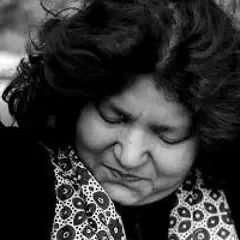Ustad Niaz
Hussain who revolutionized Sindhi music
Evergreen
fragrances of Sindh, the fertile region of our dear motherland, Pakistan, have
been a source of attraction since the beginning. This is the fragrance that is
created by the artists here. Those who infused the essence of Sindhi music in
our hours and yours and dedicated their lives to the cultivation of the art for
this purpose.
According to
Abida Parveen, he played a key role in understanding and explaining the music
of Shah Abdul Latif Bhatia.
About music, the Sindh Institute of
Music and Performing Arts (SAMPA) was introduced in 2018. This is a positive
effort of Sindh Government's Department of Tourism and Culture and Antiquities.
The first director of this institution is Naseer Mirza, a retired station
director from Pakistan Broadcasting Corporation, Hyderabad. Who is a writer intellectual, and well-known thinker of Shams Ulama Mirza Qalich Baig's
family. In his association with Radio Pakistan Hyderabad, he has worked
tirelessly to record interviews with many singers, musicians, poets, writers, and social workers. Therefore, the credit of recording most of the songs
composed in the last part of the life of musician Niaz Hussain (1936-1992) is
also on his head. Recently, a day was named after the name of musician Niaz
Hussain by Sampa. Students of Niaz Shami also participated in the question and
answer session. The greatest tragedy of musicians has been that the common
people never get to see them in the media. Singers, artists, and producers must
be seen on some channel or the other. Amridhanas of musicians who not only make
themselves famous but also the region they belong to. Province, country, and
dialect are all supported. Culture and civilization are especially important.
Due to this, it helps to establish its cultural identity in the global world.
The efforts
of these anonymous musicians, tunes, styles, Milli songs, hymns, Naat, Manqbat,
Murtiya, Soz, Salam, agricultural songs, Dehqan songs, Doganan (chorus),
Tarbiya songs, tragic songs, poems, independent poems, coffee, Vai, Dohra, Bait
and ghazals are included, which help in developing aesthetic beauty in the
media. The session explained that for research analysis of any composer's tunes
(1) Practical performance of tunes. (2) The opinion of poets, writers and
intellectuals, musicologists (3) Composers (4) Singers (5) Specific places
where it is very important to have a musical environment.
biography
of Ustad Niaz Hussain
Now coming
to the biography of Ustad Niaz Hussain: A renowned artist in classical and
Sindhi music, Ustad Gaman Khan (Gwalior family) earned the name, his son Ustad
B. Bay Khan not only maintained it, but this name is art and popularity.
overshadowed the sky. A child was born to Bibi Khan in 1936, whose name was suggested
as Niaz Hussain. Niaz Hussain's training began at home and education in the
mosque by reading the Holy Quran. After Bismillah, Niaz Hussain passed the 8th
standard from Al-Farooq Muslim School (Gadi Khata, Hyderabad Sindh) under the
guidance and guidance of famous teachers of that time Muhammad Nawaz Awan, Jan
Muhammad Jamali, and Ibn Ilyas Soomro. As soon as he regained consciousness, he
met Ustad Bebe Khan Qaser Yalalhan and the musicians in Sangat Varshet, who
played a golden role in bringing out his inner artistry.
On March 25,
1952, after the death of Ustad B. Bay Khan, he received Sharaf Talmiz from his
uncle, Ustad Mubarak Ali Khan, and Ustad Murad Ali, and besides them, he got
favor from many famous teachers to learn music. This is the reason why he was
equally skilled on many instruments, violin, harmonium, tabla, sitar, banjo, Chaturvedi, guitar, piano, accordion drums, etc. that no objection
was ever raised to any composer accompanying his tunes and compositions.
In 1948, at
the age of 12, Fazal Ali Shah Jamot, whose film name S.Gil became famous,
contributed to the background music and song lyrics of a stage play, and in
1955, a solo performance on the violin became his first public appearance. It
became popular. Musician Niaz Hussain took a permanent job at Radio Pakistan
Hyderabad in 1965 and apart from daily live programs, his 2500 compositions
are still available in the audio library. Encouraged new artists and played a
fundamental role in introducing countless artists.
In 1951, he
established an institution called Sindh Music College, which produced musicians
like Sohal Rana, Najmi Rizvi, Muhammad Yusuf, Masood Rana, Muhammad Aqil,
Ismail Banijo Nawaz, Ghulam Muhammad Ghulamun Bansari Nawaz, Rashid Ahmed and
Jamal Siddiqui. Did many plays were also staged under this institution? Which, apart from other well-known actors, the famous actor of Pakistan,
Mustafa Qureshi, also showed the essence of acting. Musician Niaz Hussain got
married in 1942 and was blessed with four children Zulfikar Ali, Nazar Hussain,
Mazhar Hussain, Amanat Ali, and a daughter Jina Olad. His children are trying to
perpetuate his art, heritage, and name and are doing it with great effort and
beauty. On a personal note, Niaz Hussain liked Raag Malkonis very much. In
1986, his art was recognized on the occasion of Lal Shahbaz Qalandar's Urs.

.webp)

Post a Comment